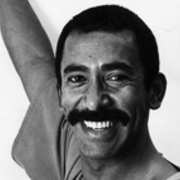
George Henare
Veteran actor George Henare has been seen on stage, film, and television, and heard on radio and talking book. In 1988, he was awarded an OBE for services to theatre; two decades later Henare was made an Arts Foundation laureate and received Te Waka Toi, Te Tohu Toi Ke, Award for his outstanding contribution to Māori theatre.
"Because my career is all about human behaviour and interaction, it is for me an endless journey of discovery, fascination and enlightenment, a journey I hope to continue on until that ‘other' big spotlight shows the way to another dimension."
George Henare grew up as third youngest in a family of ten children. Until the age of twelve he lived on a farm on the East Coast of the North Island.
Henare became involved in theatre after stints as a postman and trainee teacher. He abandoned his teaching career after a successful audition with the New Zealand Opera Company, kickstarting a prolific career on stage. Among his breakthrough roles was that of son to Inia Te Wiata in Bruce Mason's 1969 play Awatea.
In 1976 Henare won a key role in TV play The Park Terrace Murder, based on a Christchurch murder case from the 1870s. Henare played Cedeno, a part Spanish butler accused of killing a cook in the house of wealthy Canterbury landowner William Robinson.
Henare followed it with another provocative piece centered around history and race. The Governor remains one of the most ambitious television programmes yet made on New Zealand soil. Henare featured in the first episode, in the plum role of rebellious and charismatic Māori chief Hōne Heke. The performance won praise. Writing in 2018, author Annabel Cooper argues that over the course of the episode "Heke moves from challenging good humour to angry eloquence and then prescient melancholy as he comes to understand the full implications of colonial settlement".
The 80s was a lean decade for Henare on screen, with one notable exception. Hospital comedy Porters failed to fly, despite a talent-heavy creative team and an imported director, drafted in to show how television comedy is done. There were a couple of minor villain roles, including Queen City Rocker.
The exception was Henare's role in The Silent One (1984), an adaptation of Joy Cowley's myth-like novel about an outcast Rarotongan village boy, and a mythical white turtle. Henare won praise as the scheming, narrow-minded tohunga, Paui Te Po.
A decade later, Henare spent four and a half months on Easter Island, playing another power-monger — this time on Kevin Costner-produced epic Rapa Nui. Henare has admitted he loves playing villians, partly for the satisfaction audiences get from seeing their come-uppance.
1994 also saw Henare appearing in a small but important role in the classic Once Were Warriors: as Bennett, the imposing social welfare officer who compels young Boogie to take pride in his culture. Apart from Warriors, Rapa Nui and a brief role in the short film Mananui, the 90s saw Henare appearing most often on television, including guest roles in episodes of Shortland Street, City Life, and the Xena/Hercules double act.
As the century came to a close, he was also seen in historical series Greenstone, playing Chief Te Manahau, and worked on award-winning docu-drama Nga Tohu: Signatures. The programme explored the Treaty of Waitangi, the document which overseas funders had tried to remove all mention of from Greenstone. Jumping between past and present, Signatures tells the story of a fictional New Zealand town facing the consequences of a treaty claim. Signatures won acting awards at the 2000 Television Awards for Henare and Nancy Brunning, who each had double roles.
Henare joined Brunning again soon after, when he took a small role in 2001 big-screen drama Crooked Earth. He also joined the cast of Love Mussel — an acclaimed one off satire for television by playwright Stephen Sinclair — and appeared in the first two seasons of rural relationship drama Mercy Peak.
Made with American and Tahitian money, little-seen Pacific-themed family comedy The Legend of Johnny Lingo (2003) sees Henare playing the title role of a wealthy trader. The movie's cast includes Rawiri Paratene and Sima Urale.
Henare has also starred on two series of Māori Television series Kai Korero, a multi-cultural sitcom about two families who periodically share a meal. The series co-stars Annie Whittle and Ruby and Rata star Vanessa Rare — with Henare playing the aging father with a fondness for Brylcreem.
In 2010 he played judge Justice Eddie Durie in tele-movie docu-drama Stolen: The Baby Kahu Story, and Lee Kaa in Margaret Mahy fantasy series Kaitangata Twitch. The latter role won him a 2010 Qantas Television award for best actor. Henare has described his Kaitangata character as "a tormented soul. I’m the older force from another time: the guardian of the island of Kaitangata.”
In 2014 he joined Rena Owen in Toa Fraser movie The Dead Lands, in which Boy discovery James Rolleston plays the son of a Māori chieftain, out to avenge his father's murder.
Henare voiced the character of Wapiti — a wise and friendly deer — from 2018 until 2021 on Aotearoa children's animated show Darwin and Newts. In 2021, he crossed the ditch to act in series one of Australian legal comedy series Fisk, alongside Kitty Flanagan.
Updated on 31 March 2022
Sources include
Annabel Cooper, Filming the Colonial Past - The New Zealand Wars on Screen (Dunedin: Otago University Press, 2018)
Audrey Gordon, 'From Dracula to your ordinary Kiwi joker' (Interview) - The New Zealand Woman's Weekly, 18 July 1983, page 28
Lee Harris, 'Busy actor in Dunedin 'hat-trick' ' (Interview) - The Otago Daily Times, 18 July 1994